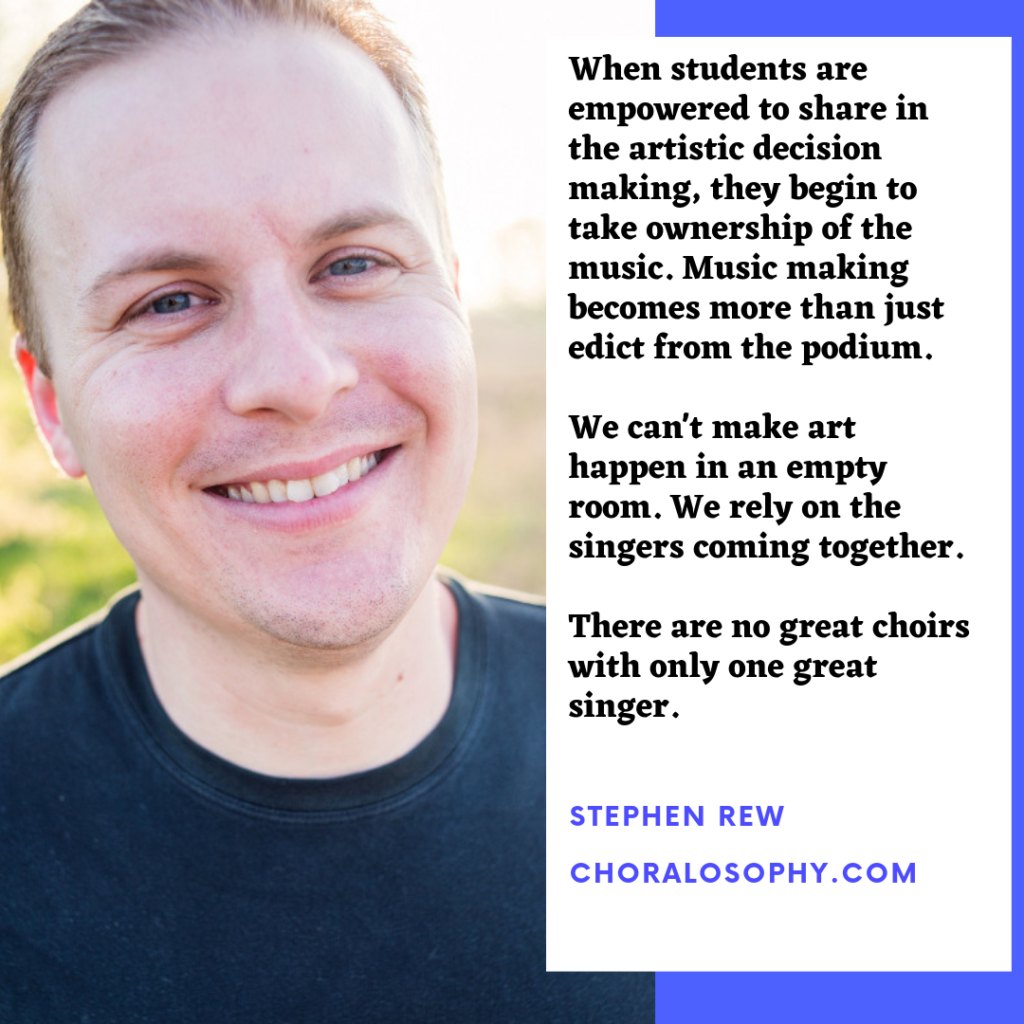In this episode I make the shocking claim that there is no such thing as a choir. Then I bring on Stephen Rew for a discussion about connecting with students on an individual level.

You can listen from the widgets below which will take you to Apple or Castbox to finish listening, or you can find the show on Google Play, Spotify, Youtube or Stitcher!
In the second part of this episode, I look to Anthony Maglione for insight into this topic from the collegiate perspective.

See more about Choralosophy and the multimedia Choral Content at www.choralosophy.com
Below you will find the full text of my essay discussed at the beginning of the first part of the episode.
Something on my mind today as I prepare young minds for a year of learning and growing as human beings through the medium of Choral Music, is the value of an individual identity in a group setting. So many people try and solve the problems of group dynamics by asking members of an association to subvert their “selves” to the group. “Disappear into the fold.” In so many group settings, including my beloved Choral Art, we are asked to “blend in.” In many choirs, “blend” is achieved by people taking everything that is special about their individual voice out of the equation. I teach the concept very differently. My ideal is that the singer adds everything that is the best about their ability to the best of the other members. We try to get rid of the average and the inefficient parts that exist in everyone. Use your strengths, and lean on your neighbor for your weaknesses. The end result is a sum that is greater than its parts and is still cohesive and unified. The metaphor to life and society should be self-explanatory.A more generic term for a group of people working together is a “team.” What is a team? Well, a team has some different dictionary definitions:
- a number of persons forming one of the sides in a game or contest: a football team.
- a number of persons associated in some joint action: a team of advisers.
- two or more horses, oxen, or other animals harnessed together to draw a vehicle, plow, or the like.
Of the above definitions, we are the most familiar with #1. The sports context. This definition tends to work in that setting because everyone’s goals are aligned. Everyone wants to win. They compete together for everyone’s mutual interest.
What happens when two individuals within a group have conflicting interests? Too often organizations treat their human members like they are using #3 as the definition. The person who can find the most people on their side, bully’s the minority and claims the virtue of having the “team’s” best interest at heart. The next step is to chain the minority to the yoke of guilt by saying, “Who are you to go against the will of the team?” This mentality is so psychologically damaging to all involved yet we do it every day at all levels of our society, from government all the way down to the elementary school playground. The damage comes in the overall reduction of the quality of the group’s output, but more importantly it damages the self-esteem of the individuals in the group. Yes that’s right…the self-esteem of the individual is MORE important than the output of the group. Why? There is no such thing as a group.
A group, like a forest, is an abstraction. (A creation of the human imagination in the abstract.) Meaning that they are creations of the human mind in the abstract, not in reality. Don’t believe me? Drive to the nearest group of individual trees, and point to the “forest.” Now draw a straight line from your finger and it will land on…an INDIVIDUAL tree. The lesson to be learned by this example is that without the reality of the individuals, the abstraction of the group would not exist. Therefore, the healthy self-esteem and confidence of the individual must be maintained. Then and only then, can a “group” achieve greatness.As a conductor, I try to find as many opportunities as possible to make individuals feel important. Find the special skills each singer has figure out a way to use them in a rehearsal. Have individual conversations as much as possible. Give individuals jobs or tasks that set them apart. See a shy kid do something great? Embarrass them by giving them a shout out in front of the whole choir. All of this can be very hard to do in large choirs. In all honesty, I haven’t figured out how to do it yet for every single one of the 400+ singers that I lead between church, school and professional ensembles. It doesn’t mean I cant try. #goals


david says
I really admire your efforts. These are really beautiful. I have totally agreed with you. Thanks for providing such information.
The 5th Wave Evan Vest
Chris Munce says
Thanks for listening!